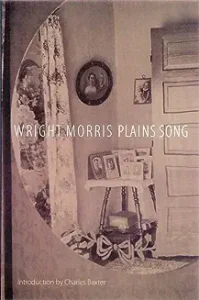Plains Song: For Female Voices by Wright Morris 1980
In his superb book of memoir and literary criticism, Peter Orner writes a chapter about Wright Morris which he begins with “The mystery of Wright Morris isn’t why he’s so forgotten, it’s that he was ever much known in the first place.” Morris wrote 33 books between 1942 and 1986 but is rarely read today despite being championed by Welty, Ellison, Bellow, Perkins, Stegner, and Charles Baxter in addition to Orner.
Baxter, another ‘writer’s writer’ wrote in his introduction to the volume of ‘Plains Song’ that I borrowed from the Cambridge Public Library, that there is a ‘special beauty of this narrative‘ . He goes on to warn the reader that the book is ‘somewhat devious, and some of its treasures may remain hidden from the casual reader. Plains Song is a wonderfully strange novel and only gets more strange and beautiful the more you look at it, like a photograph that slowly reveals its truth under very close inspection….The novel takes its time and time, finally, is one of its major subjects.” Baxter goes on to refer to the characters in this book as “about the right size, not enlarged to heroic proportions nor ironically diminished by condescension… Morris’s novel an act of lyrical attention.”
Baxter goes on to emphasize the irony of the subtitle, ‘For Female Voices’ since so much of the book is about silences, the silence of Cora , uncomplaining, complex, and powerful. He writes, “The narrative is rigorously anti-inflationary. If you are not paying attention, you might miss some or all of it….it is laconic to a fault...” Baxter concludes his introduction by writing a list of the characters—Cora and Emerson, Belle and Orion, Sharon, Beulah Madge, Ned Kibbee; and Sharon, among many others. It does little good to list them. You have to go into this world, reader, and discover them for yourself.”
And that’s what I hope you’ll do. This novel which takes place almost entirely in rural Nebraska and stretches from the first decade of the 20th C to the 1960’s is a great read, not a page turner, but a superb example of fine writing, character development, and point of view. I intend to read more Morris even if nobody else seems to be doing that.



